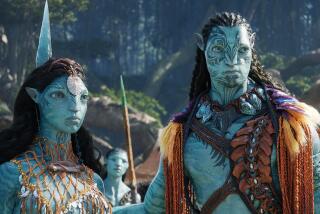THQ’s Video-Game Success Comes With Betting on Winners : Toys: The young Calabasas firm expects 1991 sales of $34 million. The fast start is linked to the popularity of films and books its products derive from.
- Share via
Video-game mania may be easing in America, but Christmas sales end today with more than 50 companies still vying for part of the Nintendo video-game market. And there’s still room for one more game marketer to make a splash, and to make its founder rich in the process.
Just ask THQ Inc. in Calabasas.
THQ, founded only 19 months ago by President Jack Friedman, expects its sales this year to reach $34 million. (The company earned $1.5 million on sales of $13.7 million in the first nine months of 1991.) The quick start reflects THQ’s early success with a video game based on the popular movie “Home Alone” and one on the hit series of “Where’s Waldo?” kids’ books, among other titles.
Like its rivals, THQ is licensed by Nintendo Co. Ltd. of Japan to develop and sell cartridges for Nintendo’s enormously popular players, which account for more than 80% of the U.S. video-game market. (Nintendo also sells games itself). THQ has games for all three of Nintendo’s formats: the original Nintendo Entertainment System (NES), of which 32 million have been sold since its 1986 debut; the Super NES system, unveiled just four months ago; and the hand-held Game Boy player, introduced in 1989.
Nintendo games currently account for 80% of THQ’s sales; dolls and board games make up the balance. THQ’s video hits are sold through such outlets as Toys ‘R Us and Kay-Bee Toy stores, and reflect Friedman’s strategy of developing games derived from books, movies, television shows, celebrities and other subjects that are already popular with his young audience--or that Friedman thinks will be popular.
That means the games have instant name recognition, which is how Friedman expects THQ’s products to stand out in the cluttered video-game aisles of toy stores.
The trouble is, lots of Friedman’s rivals have the same strategy. Three of the largest Nintendo licensees--Konami Inc., Acclaim Entertainment Inc. and Capcom USA Inc.--also sell games based on popular subjects.
“They’re not unique,” Acclaim Chairman Gregory Fischbach said of THQ. All big video-game sellers “are trying to buy licenses cheap in front of the market,” he said.
Acclaim sells games based on “The Simpsons” cartoon show, and Capcom in the past four months has sold 500,000 copies of “The Little Mermaid” game based on Walt Disney Co.’s hit movie. Konami sells seven different games based on the blockbuster “Teenage Mutant Ninja Turtles.”
Konami claims to be the industry leader with U.S. sales exceeding $200 million a year, and “because of our size we get to see everything THQ and the others get to see” in terms of potential new licenses, said Emil Heidkamp, senior vice president for Konami’s consumer division.
Of course, Friedman knows he can’t rely on name recognition only to sell his software. He also needs well-crafted games that challenge youngsters.
“If you have a good title but a poor game, you’ll get a quick shot out of the box at retail, and three weeks later it will die,” he said.
Still, there’s no denying THQ’s strong start, which could grow stronger next year. One reason: THQ’s license from Nintendo, which had covered the United States, Canada and Mexico, recently was expanded to allow THQ to start competing in Europe, Australia, Latin America and parts of Asia excluding Japan.
Friedman predicts foreign sales will account for half of THQ’s business in a couple of years.
THQ, with only 16 employees, doesn’t manufacture its games. Once it comes up with a game idea, it hires a software programmer to develop the game under THQ’s supervision. (The programmer charges about $150,000, plus a royalty of 50 cents to $1.75 per game sold.) The software is then sent to Nintendo and, if approved, Nintendo produces and sells the game back to THQ, which resells it to toy retailers.
THQ typically sells a game for 45% to 50% over its cost from Nintendo, said Brian J. Farrell, THQ’s chief financial officer. Then THQ must pay import duties, its overhead and its licensing fees to the movie studios, book publishers and other licensers from which its games are derived. The licensers get 8% to 10% of the game’s wholesale price, he said.
Despite its early surge, THQ still sells less than 10% of the games used on Nintendo players and must yet prove it’s a lasting rival in the industry. But Friedman himself has nothing left to prove. Video games already have made him rich.
His career began with LJN Toys Inc. in the mid-1960s. He was president of the company by 1986 when LJN, another Nintendo licensee, was sold to MCA Inc. Friedman, a movie nut, even toyed with the idea of producing films, but eventually he chafed under MCA’s leadership and left the company just before MCA sold LJN to Acclaim. “I don’t think I can work for any large company,” he said.
Friedman started THQ in April, 1990, with a $1-million investment. A year later, he needed cash to develop some of his licenses and so merged his company into Trinity Acquisition Corp., a publicly held shell company that had been organized to raise capital for an unspecified future venture.
In the merger, Trinity exchanged $30 million worth of its stock for THQ’s shares. Of that sum, $13 million went to Friedman for his then-46% stake in THQ. The newly merged company also kept the THQ name, which is short for “toy headquarters.”
Friedman, 52, today owns about 13% of THQ’s 20.3 million shares outstanding. With the stock closing Monday at $5.375 a share in the over-the-counter market, Friedman’s stake is worth about $14 million on paper.
In addition, there are another 5 million THQ shares now in escrow that will be distributed to the company’s stockholders if THQ reaches certain performance levels, and Friedman would get 46% of those shares. Friedman’s contract also entitles him to 3% of THQ’s pretax profit in addition to his $400,000-a-year base salary. Not bad on a $1-million investment.
Friedman’s job is straightforward, if not easy: Find a trend or personality that will be popular, then get the video-game license early at the lowest possible price to reap the highest possible return on investment.
“He went to see the movie ‘Home Alone’ the second day it was out, and he said, ‘This is something the kids will love,’ ” recalled Farrell. THQ quickly paid a mere $75,000 to Twentieth Century-Fox Film Corp. for the game license, and this year “Home Alone” games will account for 20% to 25% of THQ’s sales, Farrell said.
And like his rivals, Friedman guesses wrong on occasion and buys a license that doesn’t pay off. THQ will barely earn back the $150,000 licensing fee it paid to market a figure of rap star Vanilla Ice that’s had only lukewarm sales, Farrell said. “But the key is not to lose $1 million, not to make a big bet on a flop,” Farrell said.
These days Friedman spends lots of time with movie studios’ licensing agents and looking for new films he thinks will appeal to kids, though he doesn’t play video games himself. He also scans dozens of publications for emerging trends.
But because the whole video-game industry is now “title-driven,” Friedman’s efforts to convert more popular films or celebrities into hot-selling games won’t be easy, according to Konami’s Heidkamp. “If somebody feels they have a movie that has video-game potential, they want to get two or three bids” from different game makers, he said. “They want to pass it around.”
More to Read
Inside the business of entertainment
The Wide Shot brings you news, analysis and insights on everything from streaming wars to production — and what it all means for the future.
You may occasionally receive promotional content from the Los Angeles Times.











